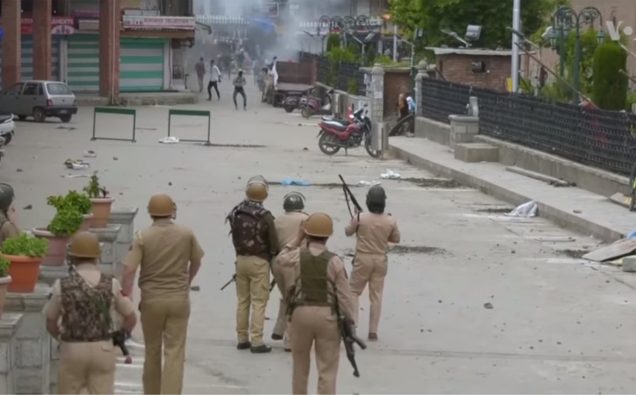
While calling Indian Prime Minister Narendra Modi’s assertion that revoking autonomy of Kashmir would bring equal rights to people as “absurd,” The New York Times has emphasized that the United Nations can no longer ignore the longstanding Kashmir dispute – a flash point between nuclear-armed Pakistan and India.
In an editorial, the paper says while Modi didn’t address the Kashmir issue in his United Nations speech, he said at a rally in Houston a few days earlier that revoking the constitutional clause on Kashmiri autonomy meant “people there have got equal rights” with other Indians now.
“That’s an absurd assertion to make about a state in the world’s largest democracy that’s essentially under martial law.”
Pakistan’s prime minister, Imran Khan, was a man on a mission at the United Nations, imploring members last week to persuade India to lift its siege of Kashmir, members of the NYT editorial board noted Wednesday.
The Times also noted Imran Khan’s statement that UN failure to do so could result in war between the neighbors if Kashmiris push back against the suffocating presence of thousands of Indian troops.
“Since Narendra Modi, the Hindu nationalist prime minister of India, revoked the semiautonomous status of the Muslim-majority state on Aug. 5, his government has imposed a curfew and detained nearly 4,000 people, including lawyers and journalists. There have been serious allegations of torture and beatings. India cut phone and internet service, leaving millions of people isolated,” the editorial says.
The paper criticizes the UN, saying resting any hopes on the United Nations seems futile, given the approach it has taken to the dispute in recent decades.
“The United Nations’ lack of resolve is a sad sign of the dysfunction in international diplomacy as American leadership declines and divisions among world powers grow. President Trump has offered to mediate, but his warm relations with the increasingly autocratic Mr. Modi — Mr. Trump attended the Houston fan fest — hardly make him an honest broker.”
The paper makes note of the economic interests of the countries in India, saying countries are unwilling to risk crossing Modi and losing access to India’s huge market.
“Pakistan is economically weak. It also damaged its standing, and its position on Kashmir, by supporting militant groups that have attacked Indian troops, stirring a conflict that has torn Kashmir apart for decades.
“Mr. Modi claims his clampdown would resolve that conflict and bring normality and development to Kashmir. But it seems more likely that it will only heighten tensions and make life more miserable for Kashmiris.
“He could avoid disaster by lifting the siege, relaxing movement across the border between zones of the Kashmiri region that are held by India and Pakistan, releasing political prisoners and allowing independent investigators to look into alleged human rights abuses. Perhaps India’s Supreme Court, responding to various legal petitions, could even order him to reinstitute autonomy.
“Those hopes are almost certainly vain.
“At least, in their last few crises, India and Pakistan demonstrated restraint. But it is easy to see how tit-for-tat actions can begin to escalate.
“The Security Council should make clear that it opposes Mr. Modi’s brutal tightening of India’s control on Kashmir. While Mr. Modi may think he can control this volatile conflict on his own, he almost certainly cannot.”


















